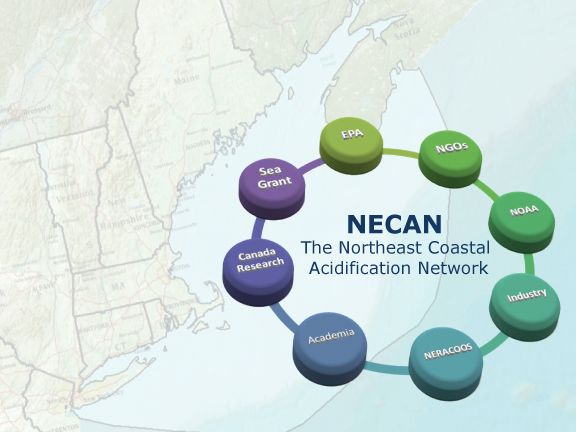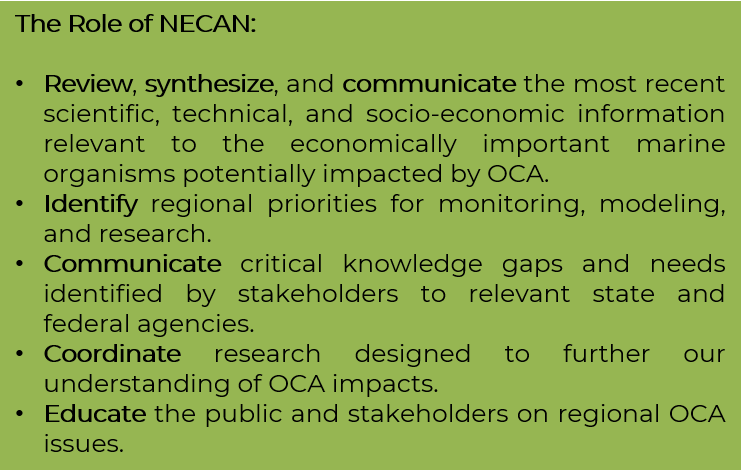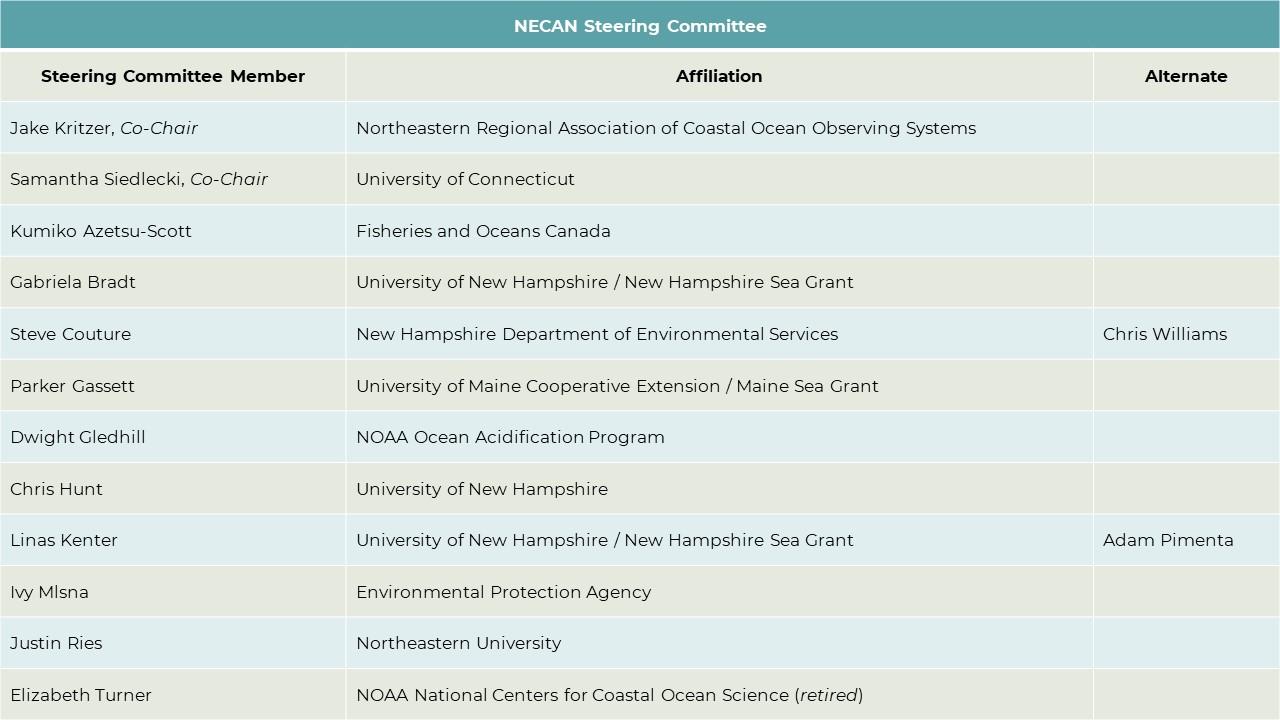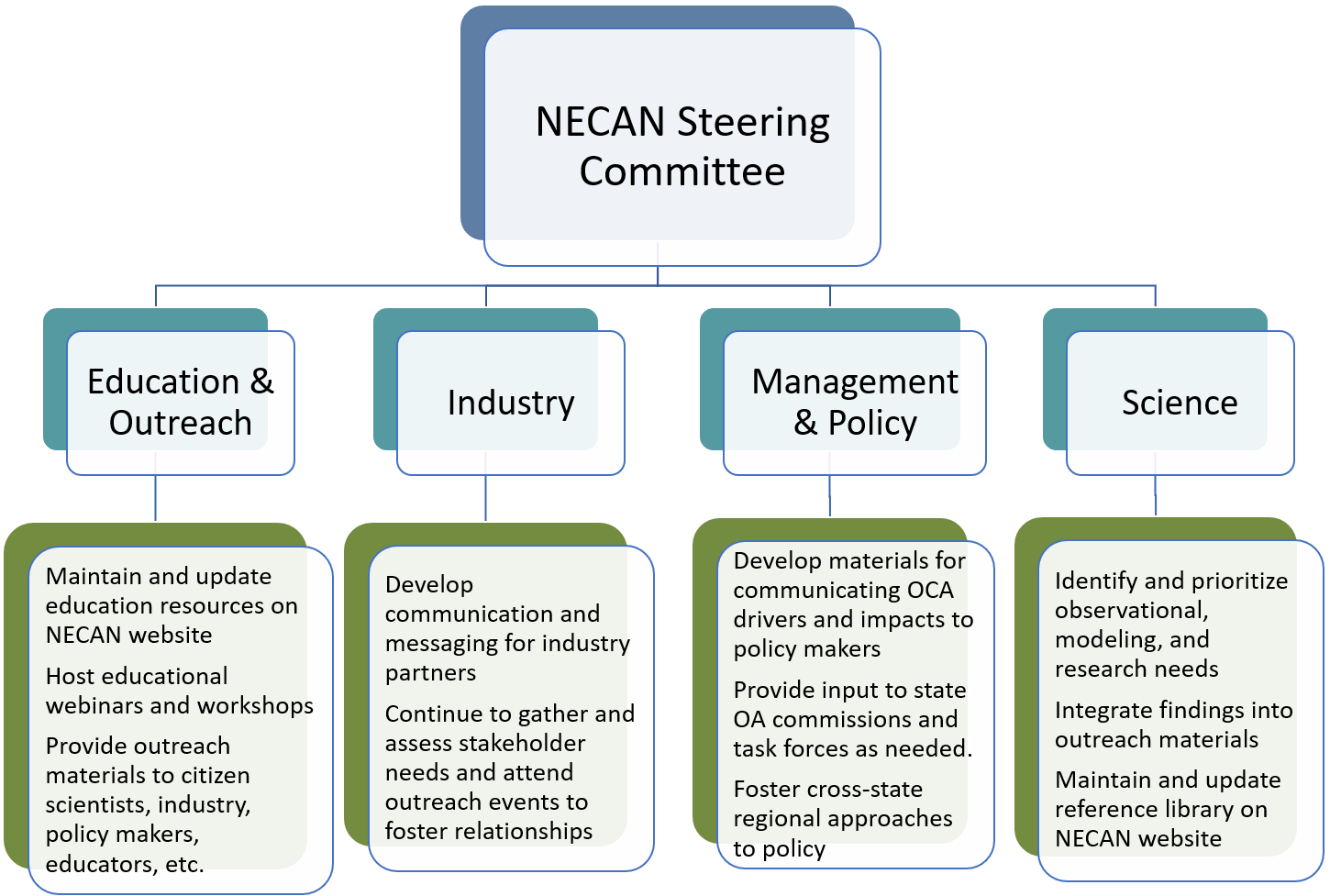Home > About Us > Newsletter - Publications - Stakeholder Workshops - Webinar Series - Videos
About Us
What is NECAN?
 The Northeast Coastal Acidification Network (NECAN) is the leading group in the region for the synthesis and dissemination of ocean and coastal acidification information. Established under the Northeastern Regional Association of Coastal Ocean Observing Systems (NERACOOS) in 2013, NECAN is a partnership among government agencies, industry members, and the scientific community. NECAN serves as a conduit through which decision makers and stakeholders can provide guidance for regional research and monitoring. The NECAN region encompasses the coastal ocean from the high-water line out to the shelf-break from Long Island Sound to Nova Scotia.
The Northeast Coastal Acidification Network (NECAN) is the leading group in the region for the synthesis and dissemination of ocean and coastal acidification information. Established under the Northeastern Regional Association of Coastal Ocean Observing Systems (NERACOOS) in 2013, NECAN is a partnership among government agencies, industry members, and the scientific community. NECAN serves as a conduit through which decision makers and stakeholders can provide guidance for regional research and monitoring. The NECAN region encompasses the coastal ocean from the high-water line out to the shelf-break from Long Island Sound to Nova Scotia.
We publish an email newsletter, produce publications, hold stakeholder workshops, provide webinars by experts, and help create and distribute videos.
 Developing Regional Understanding and Local Solutions
Developing Regional Understanding and Local Solutions
NECAN works to better identify critical vulnerabilities to ocean and coastal acidification, particularly with respect to regionally important and economically significant marine resources. NECAN serves as an interface between research and industry interests and facilitates the sharing of state-of-the-science information.
Our efforts make it possible for OCA informational resources and data products to be tailored to and informed by the interests of regional stakeholders and decision-makers. We are able to accomplish this through efforts of the NECAN Steering Committee and four Working Groups.
Our Mission and Vision
Our mission is to provide scientific information to decision makers and stakeholders regarding ocean and coastal acidification and its potential environmental and socio-economic impacts to the northeast region. NECAN strives for a region that is resilient and prepared to address and adapt to ocean and coastal acidification. NECAN will continue to be an active voice in communicating potential impacts and solutions to the region.
NECAN Steering Committee & Working Groups
To best meet the needs of stakeholders throughout the Northeast, NECAN has established a steering committee and four working groups (listed below). Each of these groups work with closely with individuals throughout the region to inform, educate, and collaborate on ocean and coastal acidification efforts. More information can be found on each of the respective working group pages.

 NECAN Working Groups and Chairs
NECAN Working Groups and Chairs
Education and Outreach Working Group
Parker Gassett, UMaine Cooperative Ext. / ME Sea Grant
Industry Working Group
Gabriela Bradt, UNH / NH Sea Grant
Linas Kenter, UNH / NH Sea Grant
Management and Policy Working Group
Elizabeth Turner, NOAA NCCOS
Steve Couture, NH DES
Science Working Group
Dwight Gledhill, NOAA OAP
Sam Siedlecki, UCONN
Why are we concerned?
Global ocean carbon chemistry is rapidly changing in response to rising levels of atmospheric carbon dioxide (CO2). One result of this changing chemistry is ocean acidification (see Overview), which reduces surface ocean pH, increases the carbon content, and causes a decrease in the availability of ions important to shell and mineral formation. The ocean's pH has declined by 0.1 globally since the industrial revolution (an increase in acidity of about 30%) and is projected to decline by an additional 0.3 over the next century unless global carbon emissions are significantly curtailed. Data show that these changes in ocean chemistry are happening at least ten times faster than at any other time over the past 50 million years. These changes have important implications for marine life and the ocean ecosystem and, in turn, the region's economy and cultural identity.
Importantly, ocean acidification conditions can be significantly altered by local processes within coastal waters. These local factors can include upwelling, riverine discharge, nutrient loading, hypoxia, organic carbon remineralization, and productivity. In some cases, these processes greatly increase the rates of local acidification. At the same time, they also offer opportunities to take local action to reduce acidification sooner than is possible through the reduction of carbon emissions into the atmosphere. NECAN works to develop a better understanding of these processes, predict the consequences for marine resources, and devise local adaptation strategies that enable communities and industries to better prepare and adapt.
Questions?
Contact us at [email protected]








